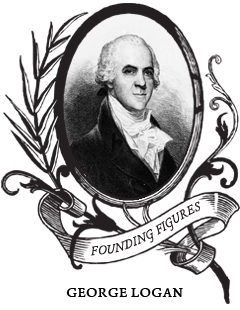Although a graduate of the University of Edinburgh Medical School, Logan gained fame as a farmer, a legislator, and politician. He was a member of the American Philosophical Society, the Pennsylvania Assembly, and a U.S. Senator. Although an enthusiastic founding member, in 1788 he formed an alternate group, the Philadelphia County Society for Promoting Agriculture, which supported Logan’s position on imported goods and tariffs. Logan, himself, was pro-French and, unsurprisingly, Thomas Jefferson called him the best farmer in Pennsylvania. At Stenton, the estate granted to his grandfather, James Logan, by William Penn, Logan conducted experiments in crop rotations. When he submitted these experiments for a Society premium, he included his thoughts on the state of American agriculture, complaining that “the free sale of the produce of the land is restricted by commercial regulations.” As might be expected, the Society did not award his experiments a premium prize, although they did acknowledge the merit of his work.
George Logan

